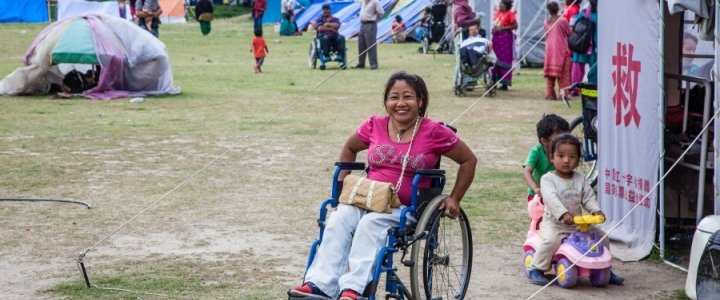Response Manager for the Australian Red Cross’ International Program, and Co-Chair of ACFID’s Humanitarian Reference Group, Jess Letch, tells the story of how the Australian Red Cross promotes the rights, protection and inclusion of all people in humanitarian operations – from their head office in Melbourne to first responders in the field. She describes the evolution of their approach to rights, protection and inclusion, demonstrating leading practice in applying Quality Principle 1 of ACFID’s Code of Conduct and supporting people affected by crises.
A history of striving for protection and inclusion
The rights of vulnerable people are at the heart of our organisation. Back in 1864, Red Cross was instrumental in developing the First Geneva Convention to protect wounded soldiers and safeguard medical operations in conflict. We continue to advocate for the protection and inclusion of the most marginalised in Australia and around the world.
At Australian Red Cross, we are proud to have one of the world’s strongest International Humanitarian Law Programs. With our partners in the region, we’ve championed disability inclusion, contributed to the Global Compacts on Refugees and Migration, advocated for women’s leadership and equity and community accountability, and worked side by side with local Red Cross and Red Crescent National Societies to achieve stronger child safeguarding mechanisms.
While Australian Red Cross was progressing this work, so were thousands of others. In recent years, the language of rights, protection and inclusion was gathering momentum worldwide. Each of these advocates, champions and program areas were out working on their own challenges. Yet we needed to take it to the next level. We needed to speak to each other better. We needed to combine our collective efforts in order to better describe, aggregate or coordinate all of our work to promote rights, protection and inclusion among vulnerable people and strengthen our results on the ground.
Closing the gap between rights, protection and inclusion
In International Programs in Melbourne, we took a step to closing the gap. We call it ‘Protection, Gender and Inclusion’ (or PGI). In 2015 Australian Red Cross established PGI as a core thematic area. For the first time, our diverse efforts to address the needs and rights of vulnerable and marginalised people had a common identity. They sat shoulder to shoulder with the established sectors such as Water and Sanitation (WASH), Health, Shelter and Disaster Management. For the first time, we had a way to talk about these efforts with a single identity, an engine-room for strategy and planning, and a focal area for financing and reporting on this work.
Bringing together like-minded people in Australia seems easy. What about the rest of the world? The best way to grow enthusiasm for a common approach was to test it out and prove that it worked.
The ACFID Code of Conduct (1.3.1) requires that members who support or undertake humanitarian assistance are guided by the humanitarian principles of humanity, impartiality, independence and neutrality.
Our new approach in the field
Using our new pool of funds for PGI, I packed my bags to Kathmandu a few days after the Nepal Earthquake as the first PGI aid worker for Red Cross. My job was to work with first responders to show that the PGI idea could work. It was a busy month. I didn’t do any of my own program implementation, but joined forces with Nepal Red Cross to show what could be done.
The Code (1.3.4) requires members to promote the role and leadership of local actors, as evidenced by the Australian Red Cross’ support for the Neapl Red Cross’ earthquake response.
Nepal Red Cross tested and procured culturally appropriate menstrual hygiene management items for relief packs. They supported a disabled people’s organisation to prepare their town camp for the wet season and establish appropriate and accessible WASH facilities. They advocated to authorities to address the neglect of a group of disabled kids living in intolerable conditions in a makeshift ‘children’s home’. We strengthened the briefing of incoming aid workers to ensure that child safeguarding was front and centre, and advised on appropriate use of photography and social media in the field.
ACFID’s Code of Conduct now gives specific acknowledgement to links between in equality and marginalisation due to sexual orientation and gender identity – this is part of Quality Principle One (Rights, Protection and Inclusion).
Nepal Red Cross provided tarps, blankets and water purification tabs for an LGBTI agency to distribute to displaced members. They actively participated in relevant sector cluster meetings and planning, linking with service providers across Nepal. They promoted the sexual and gender based violence cluster’s reporting pathways with field hospitals, and distributed SGBV reporting pocket cards in the Nepali language to 7,000 local Red Cross volunteers. Together we with health and WASH workers about the implications of caste-based discrimination, assessed programs against minimum standards for protection, gender and inclusion, generated action plans together led by Nepal Red Cross and IFRC sectoral specialists with input from LGBTI and people with disabilities, and integrated this work through the relief phase and into recovery.
What did we achieve in Nepal?
Our most important achievement in Nepal was to demonstrate that investment in an integrated PGI approach was important, practical and had a positive impact on the lives of countless people. Today, Nepal Red Cross has a strong team focussed on gender and social inclusion, PGI is a core area of focus for every emergency plan of action produced by our International Federation worldwide. It’s excellent to see that PGI aid workers are deployed to most major operations in the region, including right now in Cox’s Bazar with the Bangladesh-Myanmar Crisis, along with Sulawesi and Lombok.
The future of PGI
There is plenty more to do.
We continue to deconstruct organisational siloes and tackle legacy structures. Policies are being translated into action. Research and assessments continue to probe deeper into the experience of the most marginalised and vulnerable in emergencies.
The Code (1.3.3) requires members to coordinate and complement the work of others providing assistance.
We continue to align our work with Core Humanitarian Standard. The minimum standards for protection, gender and inclusion in emergency response have been strengthened and promoted among disaster responders in all sectors, as we coordinate with partners to build the capabilities of people across the Red Cross and Red Crescent Movement. Local networks have now taken leadership of PGI in Asia and the Pacific, and it’s great to see Red Cross and Red Crescent national societies taking the agenda forward. It’s been a long journey since 1864 and we get better every day.

Jess Letch
Response Manager, Australian Red Cross
Jess Letch is Response Manager for Australian Red Cross, managing contributions to international emergencies in Africa, Asia and Europe. Jess has 20 years’ experience in international aid, working in Africa, Asia, Europe and the Pacific for IFRC, ICRC and Australian Red Cross in conflict, post-conflict, disaster response and disaster preparedness. Jess has a Bachelor of Arts (Political Science), Postgraduate Bachelor of Social Work, completed a Master of Assessment and Evaluation with thesis on the Real-Time Evaluation of Humanitarian Action (RTE), and is a qualified trainer. She was a Monitoring and Evaluation consultant for seven years and conducted various needs analyses for ICRC and Australian Red Cross in Africa, Asia and Pacific, primarily in protection and disaster management. She has been co-chair of the ACFID Humanitarian Reference Group since 2016.
Simon holds a Master’s degree in Development Studies from Murdoch University in Western Australia and a Bachelor’s Degree (with Honours) in economic development and political science from the University of Sydney.









